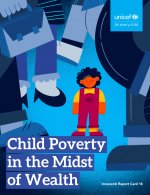
Child Poverty in the Midst of Wealth
Omschrijving
In a time of general prosperity, more than 69 million children live in poverty in some of the world’s richest countries.
Poverty is most often defined by income. But for most children, poverty is about more than just money. It is about growing up in a home without enough heat or nutritious food. Poverty means no new clothes, no telephone and no money for a birthday celebration.
These deprivations have consequences that can last a lifetime. Research shows that children in poor families are less likely to complete a good education.1 In some countries, the research indicates that life is eight to nine years shorter for a child born in a poor area than a child born in wealthy area.
Ending child poverty and its consequences is a matter of basic rights and justice.
The UNICEF Innocenti Report Card 18 reviews the status of child poverty in 43 high income and upper middle-income countries of the European Union (EU) and the Organisation for Economic Co-operation and Development (OECD). It provides data and assesses the progress – or lack of progress – that these countries have made towards eliminating child poverty.
In addition, the Report Card showcases countries’ successes and considers what more can be done to meet the challenge of the Sustainable Development Goals: to end poverty in all its forms, everywhere – including in rich countries.
The foundation of the report is a ranking of 39 countries in the EU and OECD based on their latest available rate of child income poverty and their success in reducing child income poverty over a period of general prosperity. The top ranked countries – those with the lowest rates of child income poverty combined with greatest success reducing child poverty – are Slovenia, Poland and Latvia. At the bottom of the rankings are France, the United Kingdom, Türkiye and Colombia.
